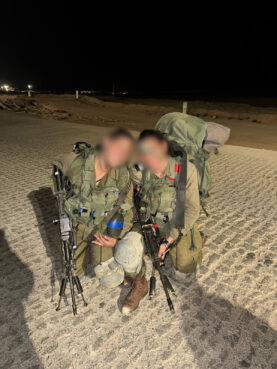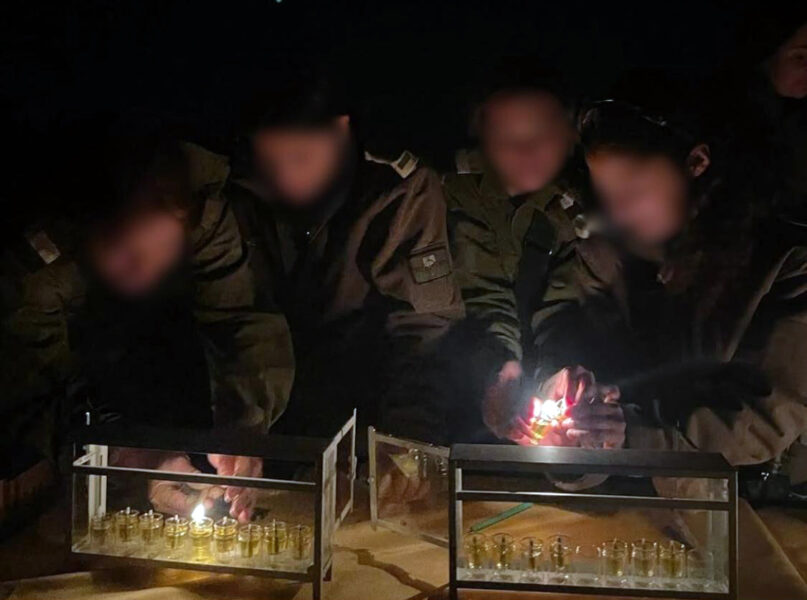JERUSALEM (RNS) — Over the years, many of the young Orthodox women studying at the Midreshet Lindenbaum seminary yearned to join a combat unit in the Israeli army but knew that staying religiously observant in a coed, religiously mixed setting would be difficult, if not impossible.
Then, in the wake of the Oct. 7, 2023, Hamas massacre, the Israel Defense Forces issued an emergency call-up of 300,000 reservists. That prompted Rabbi Ohad Teharlev, dean of Midreshet Lindenbaum, to contact IDF recruiters to propose a unit composed only of religious Jewish women.
“With the current manpower needs and strong interest from the girls, there is a natural alignment of interests. Ultimately, everyone wants what’s best for the people and the state of Israel,” Teharlev told Religion News Service recently.
The IDF agreed, and this summer, after eight months of intensive basic training, a few dozen women made history in their Orthodox communities by deploying together as combat field intelligence soldiers on Israel’s borders.

Corporal S., a 20-year-old member of the Chabad-Lubavitcher movement and a former student at Midreshet Lindenbaum, part of the Ohr Torah Stone educational network, said she felt drawn to serve as a combat soldier “because it’s important to keep people safe, and the people of Israel are my family.” (All the soldiers who spoke to RNS asked to be identified only by their first initial, in accordance with IDF protocol.)
In the Chabad community, women typically marry early and have many children, and military service for women is an anomaly. But Corporal S. said her family “supports me a lot, even if this isn’t their ideal.”
Based on the pilot project’s success, last month the Israeli military launched two additional religious women’s combat units, one dedicated to search and rescue, the other dedicated to the Iron Dome mobile air defense system.
Although Israel’s High Court has overturned the blanket military exemption ultra-Orthodox men have enjoyed for decades, Orthodox women — even if they are not Haredi, also known as ultra-Orthodox — can still apply for an exemption. Despite that opt-out, about 3,500 religious women enlisted in the IDF in 2024, including about 350 for combat positions.
While this is not the first all-women’s IDF unit, it is the first to accommodate Orthodox religious practice. Circumstances in the field permitting, the soldiers are allotted time to pray three times a day, celebrate Shabbat and holidays together and study Jewish texts. Every week, a female spiritual adviser comes to their base to teach the soldiers Jewish law and answer questions the soldiers may have.
The demands of combat often require dispensations from Jewish law’s restrictions on doing work on Shabbat, Teharlev explained. “When soldiers receive rabbinical permission to desecrate Shabbat” — by patrolling on Shabbat, driving on Shabbat, cleaning weapons on Shabbat or missing prayers — “how do they switch to civilian mode and keep Shabbat on their weekends home?” Teharlev said.

Soldiers want to know which military operations permit them to break the Sabbath. “When should they say the morning blessings if they have been awake all night on duty and only go to sleep in the morning? What about fasting? And what should they do if they’re on guard duty during the Passover Seder?”
When Corporal S. found herself in this position during the Seder last April, “I read the Haggadah out loud. It felt like the right thing to do.”
The women’s commanding officer said the fact that the entire unit consists of religious women “creates a supportive environment and a shared language that enables them to maintain their religious lifestyle.”
Corporal M., 19, who attended a post-high school army preparatory program, called a mechina in Hebrew, said her modern Orthodox parents feared she wouldn’t remain religious if she served in the military, especially in a combat position.
They need not have worried. “My religion has gotten even stronger in the army,” she said, crediting the other women in the unit. “Every one of them has something to teach me. These girls are my sisters. It’s great to be surrounded by people with the same mindset who are very up for a challenge. We inspire each other.”
The military’s recruitment needs have only increased as the war will soon enter its third year. Many reservists are now on their fifth or sixth rotations, totaling hundreds of days. Although many religious Jews in the modern Orthodox movement have joined the IDF, some enrolled in hybrid army-yeshiva programs, tens of thousands of ultra-Orthodox men now eligible for the draft are refusing to perform their service despite the new rules because their rabbis forbid it.
The women in the new unit are willing to take on their part of the burden. “These are really special girls who didn’t have to draft, and certainly not to a combat unit,” said Corporal A., 20, another Midreshet Lindenbaum alum. “Everyone is motivated, they hold themselves to the highest standards, and it shows.”
Original Source: